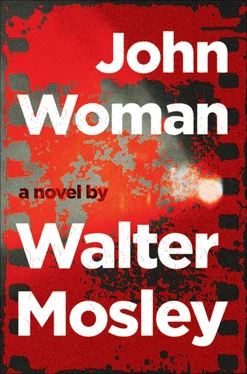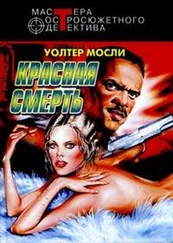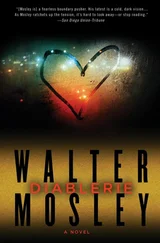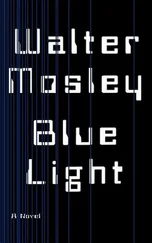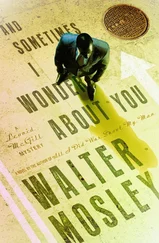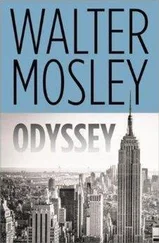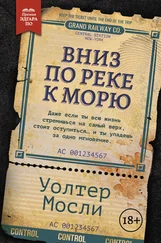“I’ve known you my whole life, Mr. Bickman.”
“France,” the ticket-taker replied.
Bickman brought out a bottle and two plastic glasses from a wooden cabinet behind him. It was Wild Turkey, about halfway filled. He poured them both shots and Cornelius drank his down. The whiskey clutched at his throat but he kept it from coming up, then he held out his glass for more.
France obliged.
“Your father was a wonderful man, CC.”
The boy nodded and chugged down the second drink.
While he was refilling the glass France said, “He wasn’t only my friend and mentor... he also saved my ass.”
“How’s that, Mr., um, France?”
“My three girls turned college-age while my wife was dying. Matilda’s cancer ate up our savings. When she was gone I had to come to work here because I didn’t have enough money to keep up the payments on the loans for tuition. That’s when I got the bright idea to skim money off of the ticket sales to help keep me from going down the toilet. I didn’t know that part of the checks and balances that the original owners put in place was that the projectionist would count heads every night. It wasn’t an exact number but close enough for your dad to tell that I was guilty as hell.
“One night after closing Herman told me he knew I was a thief. He had my butt in a sling; could have sent me and my daughters to hell. But after I explained my predicament he said that he would do the same thing if he had a child that needed to be looked after.”
“So he let you get away with it?” Cornelius felt a tingling numbness in his lips as he spoke.
“For all these years. I was over fifty thousand dollars in debt for my wife’s medical bills and college was two hundred thousand — more. But what I didn’t tell Herman was that, after he let me go, for every dollar I took I set one aside for him.”
“You did?” Cornelius said, sipping his whiskey. “Did you ever tell him?”
“When he and your mother broke up I told him. He accepted it because he wanted you to have a good start in the world after he was gone.”
“So how much is it, Mr. Bickman?” Cornelius heard himself ask. The whiskey had split him into two distinct people: the one who said things and the other who listened. France swiveled around in his chair and pulled out a small brown leather suitcase that he set on the table between them. He slid the case across the table and gestured for Cornelius to open it up.
There were neat stacks of used bills inside. Mostly tens and twenties in small packs held together by knotted string.
“One hundred and seventy-three thousand dollars,” France said. “All of it in three cases like this one. The other two are in the closet there behind you. There’s a false door back there. Nobody knows about it but me.”
Cornelius’s mind went to the dead man in the closet above them. He wondered if every building in New York held as many hidden crimes as did the Arbuckle.
“And it’s all mine?” he asked.
“Yes sir. You bet. This is my debt to your father. He risked his own freedom for my daughters’ lives. The least I can do is pay it back a little.”
“That must have been what he meant by my gift,” CC heard himself say. “He said that after he was gone he was going to give me something to help me on my way.”
France Bickman nodded.
After they finished the bottle France left. Cornelius told him he’d lock up before going home, but the boy didn’t leave the Arbuckle that night.
He walked down the center aisle of the theater looking at the worn leather seats and threadbare carpeting. The nylon screen had been sewn in half a dozen places and was in serious need of a cleaning. The light fixtures above the projection room hadn’t been dusted in a dozen years.
Cornelius went to the projection room and queued up a Buster Keaton film that the theater owned, The General. Then he went down to the front row to watch. He hadn’t sat in the auditorium since before Herman’s intestinal operation. When the film was over he played a compilation of Buster Keaton shorts.
Sometime in the middle of the night Cornelius awoke from a dream about somebody crying. He was sprawled out there on the carpet in front of the wide, bright, blank screen.
Cornelius couldn’t imagine sleeping under the roof where his father died, so instead he moved into a cheap motel called The Starlight. The Arbuckle had a deal there for out-of-town visitors who came in for the few festivals the theater hosted.
CC spent the next week reading death notices from his birth year. The Summers family — mother, father and newborn son Anthony — had died in a car crash outside Philadelphia.
Dead-alive Anthony Summers applied for a social security number at the age of eighteen. He’d attended school in Queens then CCNY for one semester. Tony’s essays, forged grades and test scores (taken after graduation) were good enough for a transfer to Yale.
At the end of his junior year Tony had his first name legally changed to John, after Violet’s cuckold husband, and his last name to Woman in homage to Detective Margolis making him say, “I am your woman.”
He kept using the name Anthony Summers until after entering graduate school at Harvard.
He was a new man in a new world ready to live life freely and without consequence.
Far out in the high desert, fifty miles or so from Phoenix, stands a very large and circular five-story structure, the walls of which are plated with tile-like strips of white marble and broad panes of dark blue glass; its round, domed, and transparent roof is fashioned from thick, green-tinted, unbreakable polymer. This is Prometheus Hall, the main academic building of the New University of the Southwest.
There are twelve equally spaced double doors around Prometheus; opposite pairs of these doors open onto hallways that cut diagonally across the first floor of the building. Each of these pathways is paved with tiles of one of six colors: the three primary hues and their secondary complements. The tiled paths meet in and cross the Great Rotunda at the center of the huge building. This central chamber is the hollow heart of the desert university: where students, faculty, staff and visitors are welcome to stop and sit on one of eighty-six white marble benches — to read, contemplate or discuss, or merely to rest.
The four upper floors each consist of twelve equally sized pie-shaped classrooms. These forty-eight lecture halls are only eleven feet wide at the entrance but broaden to four times that width at the blue glass windows that look out over the Arizona desert.
Professor John Woman arrived at Prometheus fifteen minutes before one o’clock on the first Tuesday in September. He entered the building through Door Eleven, progressed down North Violet Lane to the periphery of the Great Rotunda where he ascended the zigzagging north stairwell to the fifth floor. He stopped, leaning his back against the triple-barred chrome rail overlooking the rotunda. There he watched as students went through the broad red-rimmed doorway of Lecture Hall Two.
The young associate professor stood exactly six feet tall with thick, curly brown hair; medium-brown skin; and generous, friendly features. Despite his slender build he gave the impression of quiet physical strength.
Professor Woman studied the young people entering his classroom. Some carried briefcases while others lugged big purses, shoulder bags, and backpacks. Three students carried nothing at all, just walked through the door to sit and listen, maybe trying to figure out whether or not to drop John’s challenging INTRODUCTION TO DECONSTRUCTIONIST HISTORICAL DEVICES. If they weren’t history majors, they might switch to a pottery class or Felton Malreaux’s POETRY APPRECIATION. History majors might transfer to Gregory Tracer’s HISTORY OF THE CIVIL WAR or Annette Eubanks’s FEMINIST OR REVISIONIST HISTORY ?
Читать дальше
